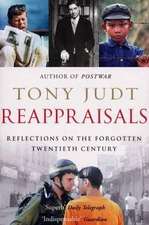The Making of Apartheid, 1948-1961: Conflict and Compromise: Oxford Studies in African Affairs
Autor Deborah Poselen Limba Engleză Hardback – 12 dec 1991
Preț: 551.42 lei
Preț vechi: 833.95 lei
-34% Nou
Puncte Express: 827
Preț estimativ în valută:
105.51€ • 110.17$ • 87.13£
105.51€ • 110.17$ • 87.13£
Carte tipărită la comandă
Livrare economică 04-10 aprilie
Preluare comenzi: 021 569.72.76
Specificații
ISBN-13: 9780198273349
ISBN-10: 0198273347
Pagini: 312
Ilustrații: 4 tables
Dimensiuni: 145 x 221 x 23 mm
Greutate: 0.51 kg
Editura: Clarendon Press
Colecția Clarendon Press
Seria Oxford Studies in African Affairs
Locul publicării:Oxford, United Kingdom
ISBN-10: 0198273347
Pagini: 312
Ilustrații: 4 tables
Dimensiuni: 145 x 221 x 23 mm
Greutate: 0.51 kg
Editura: Clarendon Press
Colecția Clarendon Press
Seria Oxford Studies in African Affairs
Locul publicării:Oxford, United Kingdom
Cuprins
Introduction; The 'problem' of influx control in the 1940s; The NAD's influx control strategy; The legislative foundations of influx control, 1948-1953; The effects of influx control during the 1950s; Labour 'canalization' 1: Realities of the urban labour market; Labour canalization 2: Operation of the labour bureaux system; The NAD's efforts to curb African urbanization; 1959-1961: The shift into apartheid's second phase; Conclusion
Recenzii
`this is an enjoyable book to read and is an excellent piece of scholarship. A wide variety of documentary sources are used intelligently and with persuasion.'Political Studies
'intelligent, original study of influx control policy in South Africa between 1948 and 1961 ... An important addition to Africanist collections for graduate students and faculty.'J.O. Gump, University of San Diego, Choice, Sep '92
'It is difficult to imagine more competent documentary research on these topics in the 1950s. Dr Posel has combed a wide range of (often obscure) published material and unpublished archival records in substantiating her argument.'T. Dunbar Moodie, Hobart and William Smith Colleges, African History, Volume 34, 1993
`careful study ... Posel offers a far more nuanced view than before of how apartheid was made and implemented ... Posel's careful study will enrich debates about the nature of the state in capitalist development far beyond the borders of South Africa'Contemporary Sociology
'this is a lucidly written presentation on a difficult topic ... this book ... provides a useful and balanced examination of the complexities of constructing and administering apartheid, but it does not fundamentally disprove the view that the apartheid regime had an underlying thrust and unity of purpose that made it essentially different from previous governments.'Patrick Furlong, Bethany College, Kansas, International Journal of Afircan Historical Studies, Vol. 26, no. 3, 1993
'valuable monograph ... it represents an indispensable contribution to modern South African history ... Posel applies her unrivalled understanding of the contortions of urban policy to highlight different phases in the emergence of apartheid.'Saul Dubow, Cahiers dÉtudes africaines, 132, XXXIII-4, 1993
'intelligent, original study of influx control policy in South Africa between 1948 and 1961 ... An important addition to Africanist collections for graduate students and faculty.'J.O. Gump, University of San Diego, Choice, Sep '92
'It is difficult to imagine more competent documentary research on these topics in the 1950s. Dr Posel has combed a wide range of (often obscure) published material and unpublished archival records in substantiating her argument.'T. Dunbar Moodie, Hobart and William Smith Colleges, African History, Volume 34, 1993
`careful study ... Posel offers a far more nuanced view than before of how apartheid was made and implemented ... Posel's careful study will enrich debates about the nature of the state in capitalist development far beyond the borders of South Africa'Contemporary Sociology
'this is a lucidly written presentation on a difficult topic ... this book ... provides a useful and balanced examination of the complexities of constructing and administering apartheid, but it does not fundamentally disprove the view that the apartheid regime had an underlying thrust and unity of purpose that made it essentially different from previous governments.'Patrick Furlong, Bethany College, Kansas, International Journal of Afircan Historical Studies, Vol. 26, no. 3, 1993
'valuable monograph ... it represents an indispensable contribution to modern South African history ... Posel applies her unrivalled understanding of the contortions of urban policy to highlight different phases in the emergence of apartheid.'Saul Dubow, Cahiers dÉtudes africaines, 132, XXXIII-4, 1993




















